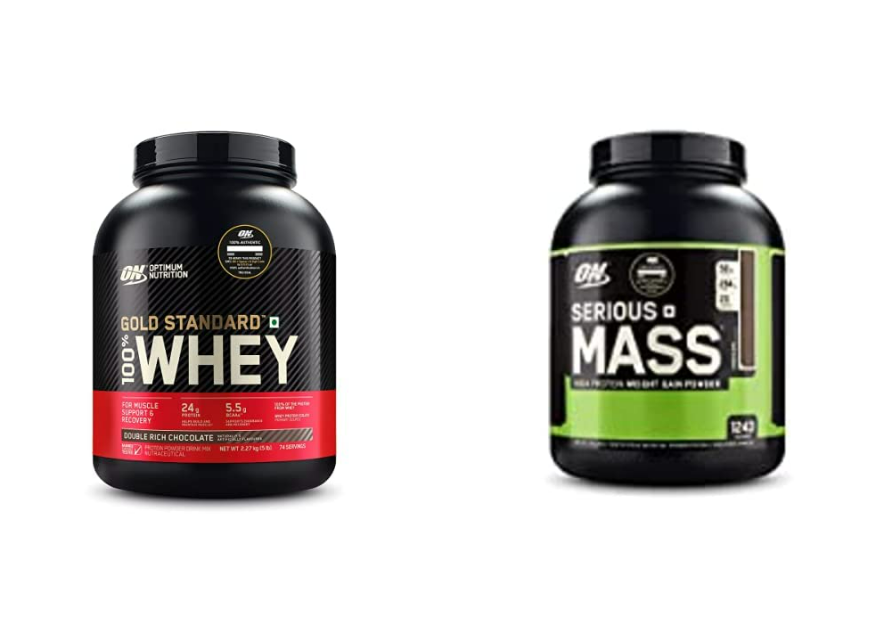Now whether you are into fitness or not or if you work out or not, this is one question that everyone once thinks about in their fitness journey or if they are ready to begin one.
Mass Gainers and Whey Protein have been two supplements which are essential in order to build a body or gain weight.
But do we know which one do we need?
According to our goals which one would best suit us?
What are the differences between the two?
If you are someone struggling with the same information or want some light on it. This blog is for you.
What is Mass gainer?
Mass gainers (weight gainers) are supplements that have a good blend of protein and other important components essential for building mass or gaining weight such as fats and carbohydrates. The purpose of mass gainers is to provide individuals with enough calories so that they can help gain some weight.
The carbs to protein ratio in the mass gainers are either 3:1 or 2:1 which obviously means that there are more carbohydrates than protein in mass gainers.
A high percentage of carbohydrates in typical mass gainers is achieved by using glucose and maltose. The Best mass gainers provide a blend of high and low glycaemic carbohydrates for post-workout glycogen replenishment.
Usually, the mixture that is made has 2 or 3 parts of the carbs and fats and one part of essential proteins. This combination ensures that any person who takes these supplements gets the required carbs and fats to gain weight along with the lean protein that helps build muscle.
What is Whey Protein?
Whey protein is obtained as a by-product of processing milk and cheese. The liquid portion that is separated from milk during the production of cheese is known as Whey. The whey is then further processed and converted in a powder form which we know as Whey protein.
Whey protein has the highest rank in terms of the biological value of protein content compared to other forms. Whey Protein is the purest protein form available. Whey protein is popular because it is easy to digest and releases into the bloodstream very quickly.
3 different types of Whey Protein:
Protein Concentrate
This is commonly referred to as Whey Protein Concentrate. Protein concentrate can range anywhere between 25 percent to 89 percent and the rest of the 20 percent consists of minerals, fats, and moisture.
Protein Isolate
Protein isolates are the purest form of protein that contains around 90 to 95 percent of protein. This protein is lactose-free and low in fat and carbohydrates.
Hydrolysed Protein
In this form of protein, the protein chains are broken down by the process of hydrolysis in its simplest form. This protein is easily absorbed and fast-digesting. Hydrolysed whey protein is the fastest way to deliver nutrient-rich whey protein to muscles for growth and recovery.
Major difference between Whey Protein and Mass Gainer
The first difference, as mentioned, is the composition of each protein. A mass gainer should have more carbs and fats and less protein than a whey protein powder. Most mass gainers have fats and carbs-to-protein ratio of 2:1 or 3:1, Whey Protein mixes can have up to 95 percent of protein with only a few grams of carbs or fats.
If your goal is to have a shredded body with a lean physique, then mass gainers are not right for you at this time. Mass gainers can help Hard gainers or bodybuilders increase body weight because of the high-calorie mass-generating formula. Whereas whey protein will help you build lean muscles and stay fit.
For Bodybuilding purposes, mass gainers are used because of the high carb and fat content. Mass gainers can raise insulin levels thereby leading to the storage of fats in the body. Whey protein helps support lean muscle mass without unwanted carbohydrates or fats.
If you are a bodybuilder bulking up or an individual who is slim with no mass in body parts such as posteriors, then taking mass gainer can be very beneficial. A mass gainer can provide the additional calories needed to put on extra weight whenever needed. However, the use of mass gainers needs to be limited and has to be combined with exercise.
A Mass Gainer should be used to increase calories, however, in some cases, prolonged use without proper exercise to burn the extra calories could add extra unwanted weight. If you are not a hard gainer or bulking, whey protein can help you continue to build lean muscle without the added calories or weight gain.
Using a mass gainer is a fast, easy, and accurate way to consume your macronutrients of protein, fats, and carbohydrates. Whey protein powder is a great source of quality protein without the added carbs, fats, and ultimately calories.
Your decision to use mass gainer or whey protein powder should depend on your goals and needs. If you are a hard gainer, wanting to add additional weight, or in bulking season using a mass gainer is a convenient and healthy way to increase calories with adequate macronutrients. Whey protein is a quality, low-calorie protein source rich with BCAAs helpful for building lean muscle and supporting recovery after training.
To help you decide if want a mass gainer or whey protein supplement answer the following questions to determine which one is right for you:
- Are you a hard gainer (do you have difficulty gaining weight or keeping weight on?
- Do you have a meal replacement or only a protein supplement?
- Do you want to bulk up or get lean?
Understanding the differences between mass gainer and whey protein can help ensure you buy the best supplement to help you reach your training and health goals.
In the end, all we have to say is
Mass Gainers include macronutrients of proteins, carbs, and fats to help promote weight gain. Whereas, whey protein powders are a more pure form of protein to help support lean muscle growth without additional calories from fats and carbohydrates.
In the end, you need to understand your goal and choose wisely. We also have a YouTube Channel where in you can get all your fitness doubts resolved and also gain more knowledge about fitness.
Thank you
Let’s get fit.



